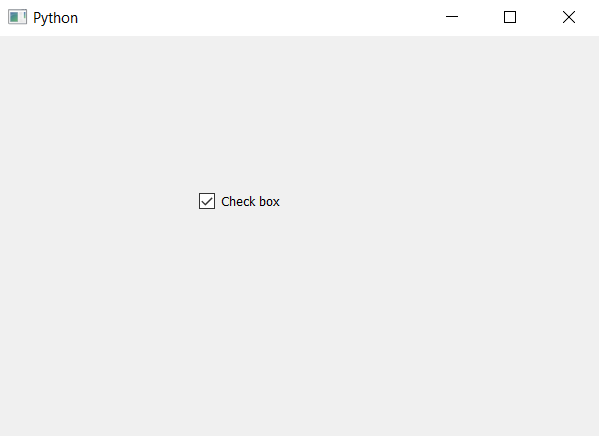isCheckedEl método se utiliza para saber si la casilla de verificación está marcada o no. Este método devolverá verdadero si la casilla de verificación está marcada; de lo contrario, devolverá falso. Si usamos este método después de crear la casilla de verificación, siempre devolverá Falso ya que la casilla de verificación predeterminada no está marcada.
Sintaxis: checkbox.isChecked()
Argumento: No requiere argumento.
Retorno: Retorna bool, verdadero es comprobado si no es falso
A continuación se muestra la implementación.
# importing libraries
from PyQt5.QtWidgets import *
from PyQt5 import QtCore, QtGui
from PyQt5.QtGui import *
from PyQt5.QtCore import *
import sys
class Window(QMainWindow):
def __init__(self):
super().__init__()
# setting title
self.setWindowTitle("Python ")
# setting geometry
self.setGeometry(100, 100, 600, 400)
# calling method
self.UiComponents()
# showing all the widgets
self.show()
# method for widgets
def UiComponents(self):
# creating the check-box
self.checkbox = QCheckBox('Check box', self)
# setting geometry of check box
self.checkbox.setGeometry(200, 150, 100, 30)
# connecting it to function
self.checkbox.stateChanged.connect(self.method)
# checking if it checked
check = self.checkbox.isChecked()
# printing the check
print(check)
def method(self):
# printing the checked status
print(self.checkbox.isChecked())
# create pyqt5 app
App = QApplication(sys.argv)
# create the instance of our Window
window = Window()
# start the app
sys.exit(App.exec())
Producción :
False True

When we run the code False will be printed and after making check box checked it will print True.
Publicación traducida automáticamente
Artículo escrito por rakshitarora y traducido por Barcelona Geeks. The original can be accessed here. Licence: CCBY-SA